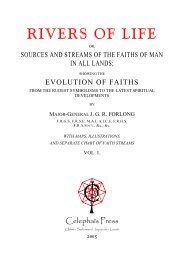Dutch Fairy Tales by William Elliot Griffis.pdf
Dutch Fairy Tales by William Elliot Griffis.pdf
Dutch Fairy Tales by William Elliot Griffis.pdf
You also want an ePaper? Increase the reach of your titles
YUMPU automatically turns print PDFs into web optimized ePapers that Google loves.
<strong>Dutch</strong> <strong>Fairy</strong> <strong>Tales</strong> for Young Folks<br />
All this, however, took a long time, even an hour or more. When his father was able to sit up and talk, Pete<br />
started to row back to the little wharf in front of his home.<br />
But where was it,—the farm, with the house and fields? Whither had they gone? Ryer was too mystified to get<br />
his bearings, but Pete knew the points of the compass. Yet his father's farm was not there. He looked at the<br />
shore of Overijssel, which he had left. Instead of the old, straight lines of willow trees, with the church spire<br />
beyond, there was a hollow and empty place. It looked as if a giant, as big as the world itself, had bitten out a<br />
piece of land and swallowed it down. Dumbfounded, father and son looked, the one at the other, but said<br />
nothing, for there was nothing to say.<br />
Meanwhile, what had become of the farm and “the Queezel,” as the neighbors still called her—that is, the<br />
mother with the children. These good people soon saw that they were floating off somewhere. The mainland<br />
was every moment receding further into the distance. In fact, the farm was moving from Overijssel northward,<br />
towards Friesland. One <strong>by</strong> one, the church spires of the village near <strong>by</strong> faded from sight.<br />
But when the wind changed from south to west, they seemed as if on a ship, with sails set, and to be making<br />
due west, for North Holland. The younger children, so far from being afraid, clapped their hands in glee. They<br />
thought it great fun to ferry across the big water, which they had so long seen before their eyes. Their stingy<br />
father had never owned a carriage, or allowed the horses to be ridden. He always made his family walk to<br />
church. Whether it were to the sermon, in the morning, or to hear the catechism expounded <strong>by</strong> the Domine, in<br />
the afternoon, all the family had to tramp on their wooden shoes there and back.<br />
As for the floating farm, the cows could not understand it. They mooed piteously, while the donkey brayed<br />
loudly. At night, and day after day, no one could attend properly to the animals, to see that they were fed and<br />
given water. One always sees a big tub in the middle of a <strong>Dutch</strong> pasture field. Neither ducks, nor geese, nor<br />
chickens minded it in the least, but the thirsty cattle and horses, at the end of the first day, had drunk the tub<br />
dry. None of the dumb brutes, even if they had not been afraid of being drowned, could drink from the Zuyder<br />
Zee, for it was chiefly sea water, that is, salt, or at least brackish.<br />
Occasionally this errant farm, that had thus broken loose, passed <strong>by</strong> fishermen, who wondered at so much land<br />
thus adrift. Yet they feared to hail, and go on board, lest the owners might think them intruding. Others<br />
thought it none of their business, supposing some crazy fellow was using his farm as a ship, to move his lands,<br />
goods and household, and thus save expense. In some of the villages, the runaway farm was descried from the<br />
tops of the church towers. Then, it furnished a subject for chat and gossip, during three days, to the women, as<br />
they milked the cows, or knitted stockings. To the men, also, while they smoked, or drank their coffee, it was<br />
a lively topic.<br />
“There were real people on it and a house and stables,” said the sexton of a church, who declared that he had<br />
seen this new sort of a flying <strong>Dutch</strong>man. It was the usual sight—“cow, dog, and stork,” and then he quoted the<br />
old <strong>Dutch</strong> proverb.<br />
At last, after several days, and when Ryer and his son were nearly finished, with fatigue and fright, in trying to<br />
row their boat to catch up with the runaway farm, they finally reached a village across the Zuyder Zee, in<br />
North Holland, where rye bread and turnips satisfied their hunger and they had waffles for dessert. Their small<br />
change went quickly, and then the two men were at their wit's end to know what further to do.<br />
By this time, out on the floating farm, the mother and children were wild with fear of starving. All the food for<br />
the cattle had been eaten up, the dog had no meat, the cat no milk, and the stork had run out of its supply of<br />
frogs. There was no sugar or coffee, and neither rye nor currant−bread, or sliced sausage or wafer−thin cheese<br />
for any one; but only potatoes and some barley grain. Happily, however, in drifting within sight of the village<br />
of Osterbeek, the mother and the children noticed that the east wind was freshening. Soon they descried the<br />
THE FARM THAT RAN AWAY AND CAME BACK 48






![[PDF] Prolegomena](https://img.yumpu.com/16774951/1/190x245/pdf-prolegomena.jpg?quality=85)









